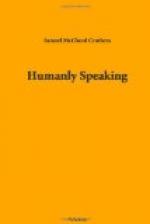When Ferrero published his history we were startled by his realistic treatment. It was as if we were reading a newspaper and following the course of current events. Caesar and Pompey and Cicero were treated as if they were New York politicians. Where we had expected to see stately figures in togas we were made to see hustling real-estate speculators, and millionaires, and labor leaders, and ward politicians, who were working for the prosperity of the city and, incidentally, for themselves. It was all very different from our notions of classic times which we had imbibed from our Latin lessons in school. But it is the impression which Rome itself makes upon the mind.
One afternoon, among the vast ruins of Hadrian’s Villa, I tried to picture the villa as it was when its first owner walked among the buildings which his whim had created. The moment Hadrian himself appeared upon the scene, antiquity seemed an illusion. How ultra-modern he was, this man whom his contemporaries called “a searcher out of strange things”! These ruins could not by the mere process of time become venerable, for they were in their very nature novelties. They were the playthings of a very rich man. There they lie upon the ground like so many broken toys. They are just such things as an enormously rich man would make to-day if he had originality enough to think of them. Why should not Hadrian have a Vale of Tempe and a Greek theatre and a Valley of Canopus, and ever so many other things which he had seen in his travels, reproduced on his estate near Tivoli?
An historian of the Empire says: “The character of Hadrian was in the highest degree complex, and this presents to the student a series of apparently unreconciled contrasts which have proved so hard for many modern historians to resolve. A thorough soldier and yet the inaugurator of a peace policy, a ‘Greekling’ as his Roman subjects called him, and saturated with Hellenic ideas, and yet a lover of Roman antiquity; a poet and an artist, but with a passion for business and finance; a voluptuary determined to drain the cup of human experience and, at the same time, a ruler who labored strenuously for the well-being of his subjects; such were a few of the diverse parts which Hadrian played.”
It is evident that the difficulty with the historians who find these unreconciled contrasts is that they try to treat Hadrian as an “ancient” rather than as a modern. The enormously rich men who are at present most in the public eye present the same contradictions. Hadrian was a thorough man of the world. There was nothing venerable about him, though much that was interesting and admirable.
Now what a man of the world is to a simple character like a saint or a hero, that Rome has been to cities of the simpler sort. It has been a city of the world. It has been cosmopolitan. “Urbs et orbis” suggests the historic fact. The fortunes of the city have become inextricably involved in the fortunes of the world.




